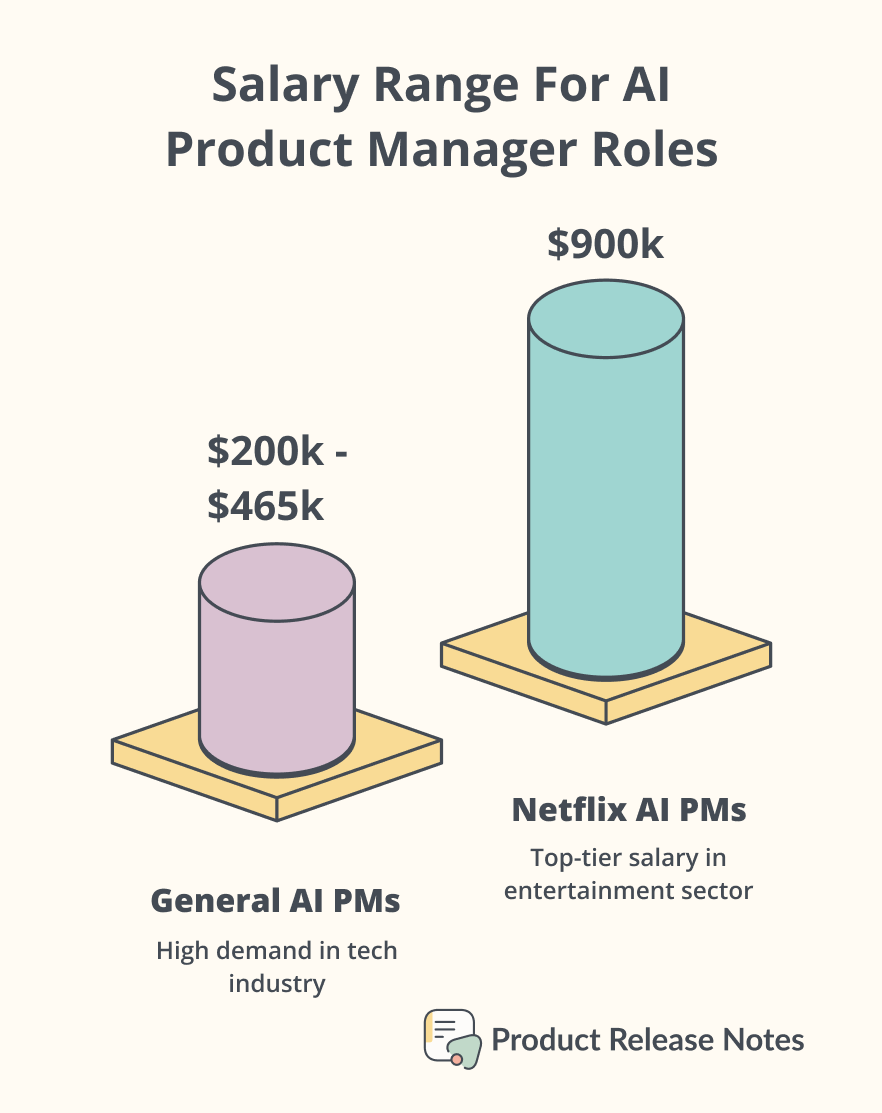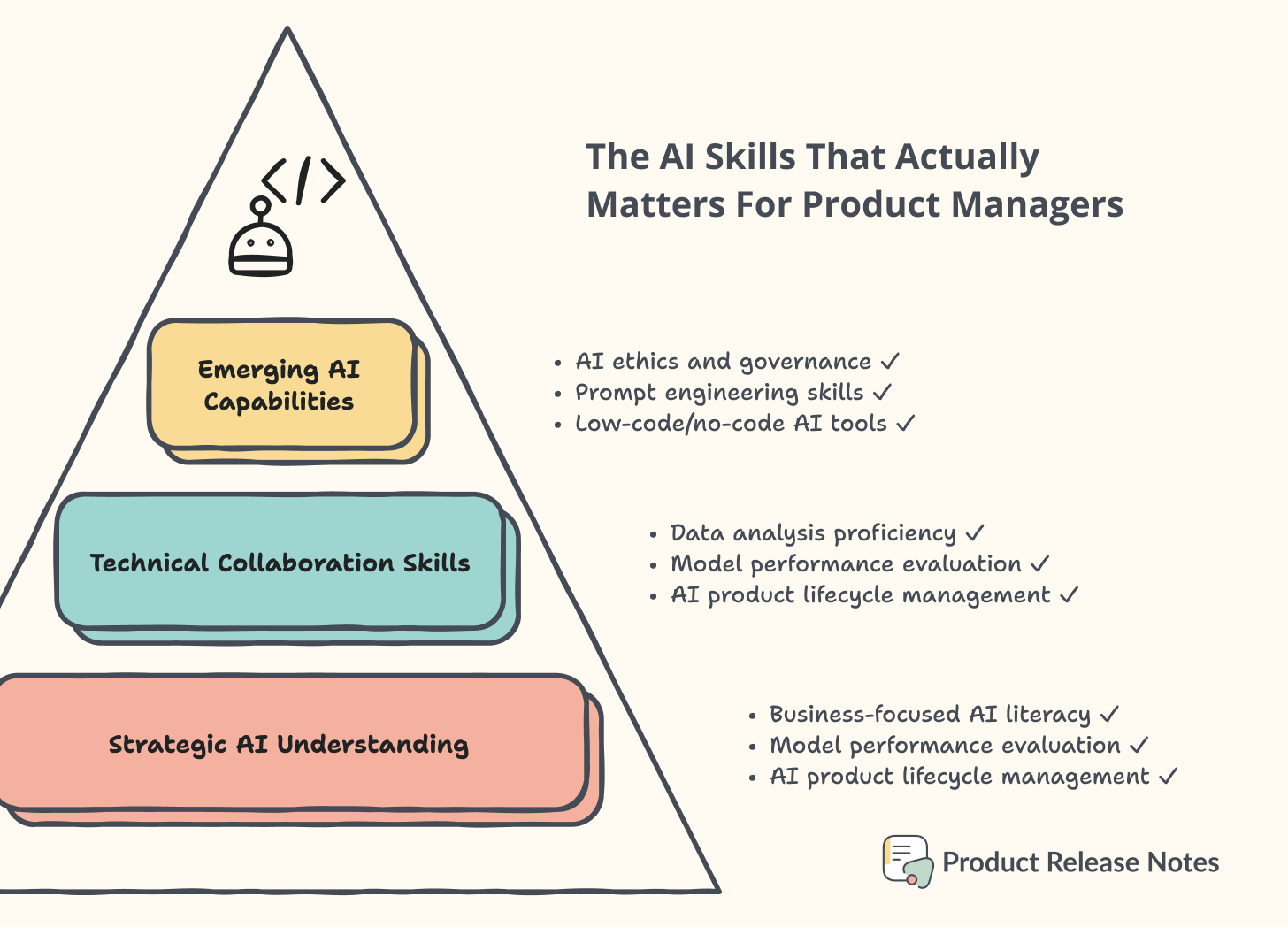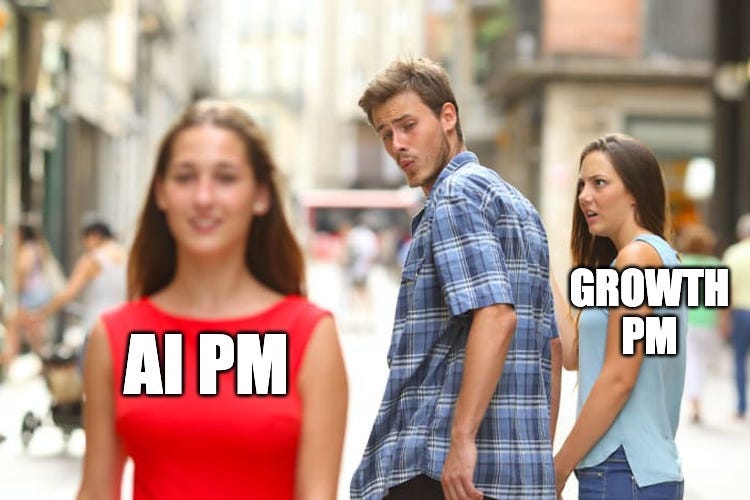How To Land An AI Product Manager Job In 2025
The job market has shifted. Traditional product skills won't get you hired easily. Here's what you need to focus your resume and land interviews at top companies now paying up to $400K for AI PMs.
The reality hit me last week when I was helping a friend with 8 years of product management experience. Despite having a good career at well known companies, he wasn't getting past initial screenings for AI product roles.
His resume was perfect for 2022. But in 2025, perfect features isn't enough.
The product management job market has fundamentally changed. Companies aren't just looking for traditional PMs anymore. They need professionals who can navigate the intersection of product strategy and artificial intelligence.
According to recent market data, AI product manager roles now command salaries ranging from $200K to $465K, with some positions at companies like Netflix reaching up to $900K. But here's the catch: traditional product managers are struggling to break into these high paying roles.
The gap is real, and it's widening fast.
The New Rules Of Product Management
The demand for AI skills in product management isn't just a trend anymore like in 2024. It's a fundamental shift that's rewriting job descriptions across industries.
Top Industries Hiring AI Product Managers Right Now:
Technology & SaaS companies remain the largest employers, with companies like OpenAI, Anthropic, and Visa actively recruiting.
Financial services and fintech are investing heavily in AI-driven fraud detection and risk management products.
Healthcare and biotech companies are building AI diagnostic tools and treatment optimization platforms.
E-commerce and retail brands are implementing AI-powered personalization and recommendation engines.
Manufacturing and logistics sectors are adopting AI for predictive maintenance and supply chain optimization.
The numbers paint the story. AI-related product manager positions have grown 40% year over year, with the highest concentration in the US tech hubs and major European cities.
But here's what most people don't realize: the skills that made PMs successful in the past aren't enough anymore.
The AI Skills That Actually Matters for PMs
After doing a deep research of AI PM job postings and hiring managers, I've identified a clear hierarchy of skills that actually get you hired. This isn't about becoming a data scientist. It's about understanding enough to lead AI initiatives effectively.
Tier 1: Strategic AI Understanding (Most Important)
Business-focused AI literacy tops the list. You need to understand supervised vs. unsupervised learning, know when to use different model types, and recognize AI's business applications.
Model performance evaluation comes next. Understanding metrics like precision, recall, and F1 scores helps you make informed product decisions.
AI product lifecycle management is crucial. This includes knowing MLOps basics, data pipeline concepts, and how AI products differ from traditional software.
Tier 2: Technical Collaboration Skills
Data analysis proficiency using tools like SQL and Python basics helps you work effectively with data teams.
Understanding of cloud AI platforms like AWS, Azure, or GCP shows you can navigate modern AI infrastructure.
Familiarity with AI frameworks such as TensorFlow or PyTorch, even at a high level, improves your credibility with engineering teams.
Tier 3: Emerging AI Capabilities
Prompt engineering skills for working with large language models are becoming increasingly valuable.
Low-code/no-code AI tools experience demonstrates adaptability to rapid AI tooling evolution.
AI ethics and governance knowledge addresses growing regulatory and compliance requirements.
The key insight? You don't need to be a machine learning engineer. You need to be fluent enough to bridge business and technical teams effectively.
Resume Before vs. After AI Examples
Let me show you exactly how to transform a traditional PM resume into an AI-ready one that passes ATS filters and impresses recruiters.
❌ BEFORE: Traditional PM Bullet Point
"Managed product roadmap and coordinated with engineering team to deliver features on schedule, resulting in 15% user engagement increase."
✅ AFTER: AI-Enhanced PM Bullet Point
"Led development of ML-powered recommendation engine, collaborating with data science team to implement collaborative filtering algorithms that increased user engagement by 15% and reduced churn by 8%"
❌ BEFORE: Generic Analytics Experience
"Analyzed user data to inform product decisions and improve conversion rates."
✅ AFTER: AI-Focused Analytics Experience
"Designed A/B testing framework for ML model performance evaluation, analyzing user behavior data with SQL and Python to optimize conversion funnel, achieving 23% improvement in lead conversion rates."
Key ATS Keywords To Include:
Core AI Terms: Machine Learning, Artificial Intelligence, Deep Learning, Neural Networks, NLP, Computer Vision
Technical Skills: Python, SQL, TensorFlow, PyTorch, AWS, Azure, MLOps, Data Pipeline
Product Management: Product Roadmap, User Stories, A/B Testing, KPIs, OKRs
Business Impact: ROI, Revenue Growth, User Acquisition, Churn Reduction, Cost Optimization
Remember: recruiters don't just search for keywords. They look for people who are actively contributing to industry conversations and demonstrating continuous learning in AI.
For example, your LinkedIn activity should tell the story of someone who's not just qualified for AI PM roles but passionate about shaping the future of AI products.
If you are looking for a tool to help you with this Paweł Huryn has AI agents for product managers, one in particular on resumes. Go check it out!
Update Your LinkedIn Profile
If you are like me, your LinkedIn profile is probably losing you AI PM opportunities right now. I always forget to update LinkedIn. Also, most traditional PM profiles look identical to recruiters scrolling through hundreds of candidates daily, that makes things hard!
Note: I’ll be applying this strategy for me to in the next days.
The Headline
Your headline has 3 seconds to stop a recruiter from scrolling past. Most PMs waste this precious real estate with generic titles like "Product Manager at Company X."
Traditional PM Headlines (That Don't Work):
"Senior Product Manager at TechCorp"
"Experienced Product Manager | SaaS Expert"
"Product Manager | MBA | 5+ years experience"
AI PM Headlines That Get Clicks:
Example 1: "AI Product Manager | Led ML-powered features that increased user engagement 40% | Bridging AI technology with business strategy"
Example 2: "Product Manager specializing in AI/ML | Expert in model deployment & cross-functional AI team leadership | Ex-Google, Stanford MS"
Example 3: "AI Product Leader | Built recommendation engines serving 2M+ users | LLM integration & MLOps specialist"
Headline Formula That Works:
[Role] | [Specific AI Achievement/Impact] | [Key AI Skills/Technologies]LinkedIn Headline Optimization Checklist:
✔ Include specific AI technologies you've worked with (TensorFlow, PyTorch, MLOps, LLMs)
✔ Quantify your impact with numbers that matter to AI product success
✔ Use power words like "Led," "Built," "Scaled," "Optimized"
✔ Target relevant keywords that AI PM recruiters search for
✔ Stay under 220 characters to avoid getting cut off
The Summary
Your summary needs to tell a compelling story about your AI journey while hitting the right keywords for search optimization.
AI PM Summary Template:
I help companies unlock AI's business potential by building products that users love and models that scale.
Currently leading AI product initiatives at [Company], where I've:
• Built ML-powered recommendation system serving 2M+ daily users, increasing engagement 35%
• Led cross-functional team of data scientists and engineers to deploy 5 AI models to production
• Established MLOps processes that reduced model deployment time from weeks to hours
My approach combines deep AI technical understanding with user-centered design. I bridge the gap between what's technically possible and what creates real business value.
Core AI PM Expertise:
Machine Learning Strategy | Model Performance Optimization | Cross-functional AI Team Leadership | Data-Driven Product Decisions | LLM Integration | AI Ethics & Governance
Recent wins:
🚀 Led AI chatbot launch that reduced customer service costs 40%
📈 Designed A/B testing framework for ML model performance, improving accuracy 15%
🎯 Established product metrics for AI initiatives, driving $2M+ ARR growth
Looking to connect with fellow AI product leaders and explore opportunities where I can drive AI transformation.Summary Writing AI Prompt:
Role: You are a LinkedIn profile optimization expert specializing in AI product management.
Task: Write a compelling LinkedIn summary for an AI Product Manager with [X years] experience in [industry]. Optimize for both human readers and LinkedIn search algorithms.
Include: [Your specific achievements, AI technologies used, quantified results]
Output: A 150-200 word summary that includes relevant keywords, shows personality, and demonstrates AI PM expertise clearly.Skills Section Strategy
The LinkedIn Skills section is crucial for AI PM roles because recruiters filter candidates by these keywords.
Must-Have AI PM Skills (In Order of Importance):
Tier 1 (Essential):
Machine Learning
Artificial Intelligence
Product Management
Cross-functional Team Leadership
Data Analysis
Strategic Planning
Tier 2 (Highly Valuable):
MLOps
Python
SQL
A/B Testing
User Research
Agile Methodology
Tier 3 (Differentiating):
TensorFlow
PyTorch
Natural Language Processing
Computer Vision
AI Ethics
Model Deployment
Skills Section Hack: Ask colleagues and connections to endorse your AI-specific skills. LinkedIn's algorithm prioritizes profiles with more skill endorsements.
Experience Section Optimization
Transform your existing PM experience to highlight AI capabilities, even if you haven't held an official AI PM role yet.
❌ Before (Generic PM Bullet):
"Managed product development team and delivered features according to roadmap timeline."
✅ After (AI-Focused PM Bullet):
"Led cross-functional team of 8 engineers and data scientists to deploy machine learning recommendation system, resulting in 25% increase in user engagement and $500K additional quarterly revenue."
Experience Section AI Prompt:
Role: You are a resume optimization expert for AI Product Managers.
Task: Rewrite these product management experience bullets to emphasize AI/ML capabilities and quantified business impact.
Current experience: [Paste your current bullet points]
Output: Rewritten bullets that include AI terminology, specific technologies, and measurable results that would impress AI PM hiring managers.Entry-Level vs. Experienced PM Strategies
Your approach should differ dramatically based on your experience level.
👶 For Career Changers and New PMs:
Focus on transferable skills from adjacent roles. If you're coming from consulting, emphasize analytical thinking and stakeholder management.
Highlight AI coursework and certifications prominently. Coursera's Machine Learning course or Google's AI Product Manager certificate carry weight.
Build a portfolio of AI projects. Even simple projects using no-code AI tools demonstrate practical application.
Emphasize soft skills like strategic thinking, communication, and adaptability, which remain crucial in AI PM roles.
👨 For Experienced PMs Pivoting:
Reframe existing experience through an AI lens. That personalization feature you built? It used algorithmic recommendations. That analytics dashboard? It was data-driven decision making.
Showcase collaboration with technical teams. Highlight experiences working with engineering, data science, or analytics teams.
Demonstrate learning agility. Include recent AI-related training, conferences attended, or side projects completed.
Quantify business impact in ways that translate to AI contexts: improved efficiency, automated processes, data-driven insights.
Common Mistakes That Kill Your Application
📝 Resume Mistakes:
AI buzzword stuffing without context or proof. Saying you have "AI expertise" without demonstrating it is worse than not mentioning AI at all.
Overemphasizing technical skills at the expense of product fundamentals. You're still a PM first.
Generic bullet points that could apply to any PM role. Every bullet should tie to either AI or product impact.
Ignoring soft skills. AI PMs need exceptional communication skills to translate between technical and business teams.
📢 Interview Preparation Mistakes:
Not preparing for AI-specific questions about model evaluation, bias detection, or ethical considerations.
Failing to understand the company's AI stack or competitive landscape.
Unable to explain AI concepts to non-technical stakeholders clearly.
Lack of concrete examples of working with data science or ML engineering teams.
Final Thoughts
The transformation we are seeing now is just the beginning. I wonder if AI product management will become the default role for product managers in the coming years. Just as mobile product management became the norm in the smartphone era.
It may be a good time to update my product managers roles post. 😉
What This Means for Your Career
Early movers have a significant advantage. The PMs who develop AI skills now will have 2-3 years of experience when the market fully shifts.
Traditional PM roles won't disappear immediately, but they'll increasingly be at companies that are behind on AI adoption.
The skill gap creates opportunity. Companies are willing to pay premiums for PMs who can bridge AI and product effectively.
Your next career move should position you at the intersection of product strategy and artificial intelligence. The companies building the future need leaders who understand both domains, and they're willing to pay accordingly.
The window of opportunity is open, but it won't stay that way forever. 🙅🏻
In the next few days I will transform all these tips into my resume, cv and interviews. Would you like to know how it goes?
Also, what AI PM skills are you planning to develop first? Share your strategy in the comments below.






Good framework @Elena Calvillo . Here is a post I shared recently on job market and product jobs https://substack.com/@ajithakoduri/note/c-148592134